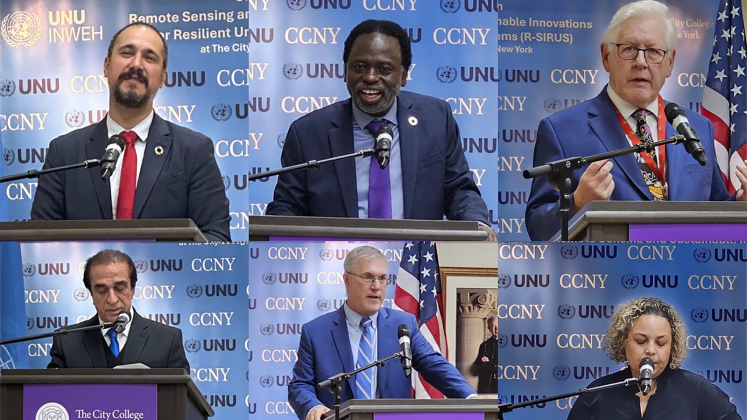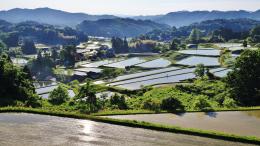New York, 5 November 2024 – A new United Nations University (UNU) Hub was launched on Remote-Sensing and Sustainable Innovations for Resilient Urban Systems (R-SIRUS) at the City College of New York (CCNY), the founding institution of the City University of New York. This Hub, in close partnership with the UNU Institute for Water, Environment and Health (UNU-INWEH), will connect CCNY to UNU’s global research and educational efforts, contributing to the UN Sustainable Development Goals (SDGs), international relations, and the advancement of sustainable cities.
The launch event was attended by distinguished guests, including Professor Tshilidzi Marwala, Rector of UNU and Under-Secretary-General of the United Nations, Ambassador Bob Rae, Permanent Representative of Canada to the United Nations in New York and the President of the United Nations Economic and Social Council (ECOSOC), Professor Vincent Boudreau, President of CCNY, and Professor Kaveh Madani, Director of UNU-INWEH. At the end of the launch ceremony, a partnership agreement was signed by Rector Marwala, and CCNY President, Professor Vincent Boudreau.

The new UNU Hub is the first one in the United States and the first one in the world that will be focused on remote sensing and the sustainability problems of complex urban systems. It aims to enhance the adaptability of cities worldwide to climate-related challenges, fostering inclusivity and resilience in urban spaces. Located at CCNY in New York City, this Hub will leverage the university’s strong legacy in science, technology, and urban innovation to serve as a global model for resilient, inclusive, equitable, and sustainable urban development.
“New York City is an ideal location for a hub dedicated to sustainable urban transformation. This collaboration with CCNY represents a powerful commitment to leverage science and technology to make cities more adaptable and resilient,” said Professor Tshilidzi Marwala at the launch event. “Our partnership with CCNY will not only benefit the city but will also contribute to global urban sustainability efforts through knowledge sharing and capacity building, particularly benefiting the Global South.”
The UNU Hub will bring together interdisciplinary experts to work on solutions addressing extreme weather impacts, urban water and energy needs, and social inequalities affecting urban communities. The UNU R-SIRUS Hub will operate with three primary pillars: Research and Development, Education and Capacity Building, and Policy and Advocacy. These pillars aim to bridge scientific innovation and policy-making, providing actionable solutions to pressing urban challenges.
“Our college has always been especially sensitive to the obligation of public educational institutions to serve the public interest,” said President Boudreau. “Over the decades, we have made substantial investments in remote sensing climate change in water and energy systems. This partnership allows us to divest those resources in ways that will be most publicly impactful, and we're thrilled to be doing this work in partnership with UNU.”
As the academic arm of the United Nations with 13 institutes in 12 countries, the United Nations University addresses a range of global development challenges through joint research and education. Its headquarters are based in Tokyo, Japan. The formation of this Hub will enable active partnership between CCNY and UNU-INWEH, based in Richmond Hill, Ontario, Canada. UNU-INWEH is working on major sustainability issues, dealing with the most pressing water, environmental, and health problems worldwide.
Professor Kaveh Madani, Director of UNU-INWEH, emphasized the hub’s potential for global impact: “This initiative reflects UNU’s commitment to addressing sustainability challenges. By combining UNU’s global perspective with CCNY’s localized expertise, the R-SIRUS Hub will serve as a model for other cities around the world.
"City College has unique scientific strengths in remote sensing but what makes the City College of New York special is its historic contribution to making education affordable, accessible, and inclusive in the United States. We value this success and will work with our colleagues at the City College to make knowledge accessible globally," he added.
Madani acknowledged the great support of the new partnership by the Federal Government of Canada as the host government of UNU-INWEH, recognizing the potential for this UNU Hub to act as a catalyst for sustainable solutions to climate-related challenges in urban centers.
"A global climate crisis requires a global response and, in that global response, it's important that we link what is happening globally to what is happening locally, and I can't think of a better place to do this in the United States than in the city of New York, and there's no place to do it better than at The City College of New York." Said Ambassador Bob Rae, Permanent Representative of Canada to the United Nations in New York and President of the United Nations Economic and Social Council (ECOSOC) who spoke on behalf of Canada at the opening ceremony.
The Hub at CCNY will have three research clusters: 1) Emerging Technologies for Earth Monitoring and Remote Sensing of Urban Systems; 2) Climate Change Impacts on Health in Underserved Urban Communities; and Energy Innovations for Sustainable Urban Environments. It also offers a range of joint M.Sc. and Ph.D. programs with UNU to CCNY students in addition to opportunities for short training courses, internships, and certified education programs. The Policy, Advocacy, and Outreach pillar of R-SIRUS will work closely with New York City authorities and international stakeholders to develop policies that promote equitable and sustainable urban transformation. The Hub’s policy-focused activities will address environmental justice issues in underserved communities, contributing to inclusive urban planning. Led by experts from the Colin Powell School of Civic and Global Leadership at CCNY, this pillar will focus on translating scientific research into actionable policies that support resilience and sustainability in urban environments globally.
Prof. Alexander Couzis, Dean of The Grove School of Engineering and Professor Reza Khanbilvardi, NOAA Chair Professor, will serve as the Executive Co-Directors of the UNU Hub at CCNY—R-SIRUS. The main office of R-SIRUS will be at the Grove School of Engineering at the CCNY's main campus while the Hub will also have satellite offices at CCNY's Division of Interdisciplinary Studies on Broadway in the Financial District of New York to maximize its reach to working professionals in addition to researchers and students.
Media Contact
Sogol Jafarzadeh
UN and Government Relations Coordinator, UNU-INWEH
sogol.jafarzadeh@unu.edu





